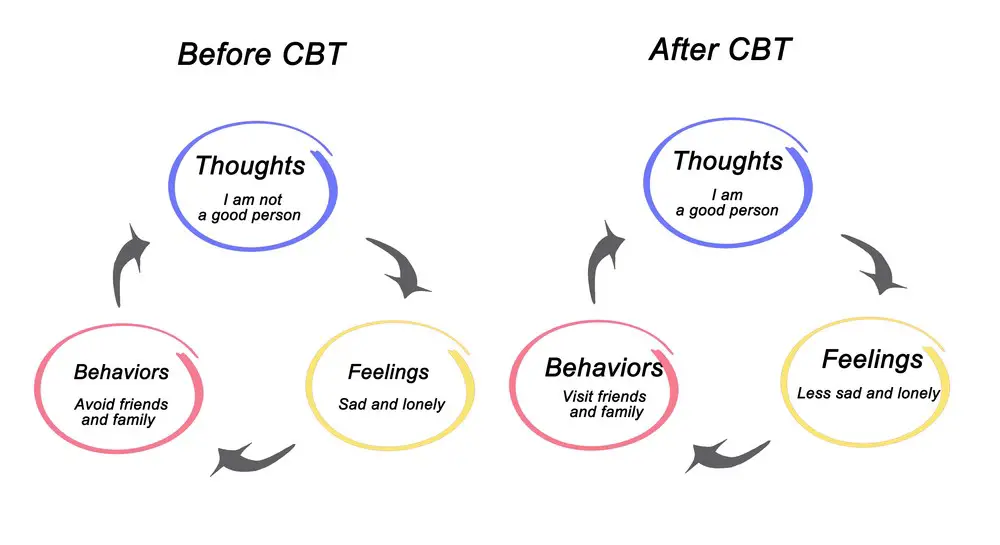As a BetterHelp affiliate, we receive compensation from BetterHelp if you purchase products or services through the links provided
Embarking on the therapy journey can often feel like navigating through an intricate web of emotions and thoughts. It’s a path that promises transformation—a gentle and progressive reshaping of the mental landscape.
Through therapy, individuals are offered a safe space to explore their deepest feelings, confront their fears, and unlock the healing potential that resides within them.
This guide is crafted to demystify the therapeutic process, provide solace and understanding, and illuminate the path toward emotional resilience and personal growth.
The Journey Through Therapy
Establishing Trust

At the heart of a therapeutic relationship lies the establishment of trust. It is the bedrock upon which all subsequent work is built, allowing individuals to divulge their innermost thoughts and fears without judgment. A therapist’s compassionate presence creates a bastion of confidentiality and understanding, which is vital for clients to feel secure. This secure bond enables a journey of openness and authenticity, vital for healing and transformation.
Identifying Patterns
Through the lens of empathy, therapy aids in uncovering recurring thoughts and behavioral patterns. Clients can learn to spot the intricate threads that weave through their mental tapestry with a therapist’s guidance, contributing to their daily struggles. Recognition is the first step toward change, and this understanding allows one to navigate the complexities of one’s mental health with newfound clarity.
Processing Emotions
The therapeutic space resembles a sanctuary where complex emotions are allowed and encouraged to surface. Clients unravel the narratives that have shaped their emotional responses by delving into these emotions with a supportive therapist. This process is pivotal in fostering a deep and enduring comprehension of oneself and the many experiences that carve our dynamic landscapes.
Developing Coping Strategies
 As challenges arise, therapists collaborate with clients to tailor personalized coping strategies. These strategies serve as navigational tools for weathering the storms of life, equipping individuals with practical techniques to manage stress and adversity. With a therapist’s support, clients become adept in implementing these strategies, paving the way for a more balanced and resilient existence.
As challenges arise, therapists collaborate with clients to tailor personalized coping strategies. These strategies serve as navigational tools for weathering the storms of life, equipping individuals with practical techniques to manage stress and adversity. With a therapist’s support, clients become adept in implementing these strategies, paving the way for a more balanced and resilient existence.
Fostering Self-Compassion
Learning the art of self-compassion is a transformative element of therapy. It’s about replacing the harsh critic inside with a voice of kindness and understanding—a fundamental shift that fosters healing. Therapists guide clients in practicing self-compassion, nurturing a loving acceptance of themselves as imperfect beings.
Empowering Change
Ultimately, therapy is about empowerment—equipping individuals with the insights and tools to enact positive changes in their lives and relationships. With each session, clients are steered towards a path of growth and self-discovery, enabling them to reimagine their narratives and step into a life rich with possibility and purpose.
Tools and Techniques in Therapy
Cognitive Behavioral Therapy (CBT)
 Cognitive Behavioral Therapy, or CBT, operates on the premise that our thoughts, feelings, and behaviors are intricately linked. By identifying and challenging unhelpful cognitive distortions and maladaptive behaviors, CBT strives to improve emotional regulation. It empowers clients to disrupt negative patterns and teaches practical skills for coping with various psychological challenges, making it a highly effective form of therapy for a wide range of mental health issues.
Cognitive Behavioral Therapy, or CBT, operates on the premise that our thoughts, feelings, and behaviors are intricately linked. By identifying and challenging unhelpful cognitive distortions and maladaptive behaviors, CBT strives to improve emotional regulation. It empowers clients to disrupt negative patterns and teaches practical skills for coping with various psychological challenges, making it a highly effective form of therapy for a wide range of mental health issues.
Psychodynamic Therapy
Psychodynamic Therapy delves into an individual’s past to unravel the unconscious dynamics that dictate current behaviors and emotional states. This introspective journey can uncover deep-rooted feelings and unresolved conflicts, providing insight into recurring patterns that influence one’s life. It’s a pathway to understanding and healing, with an empathetic therapist guiding this complex exploration of the self.
Humanistic Therapy
With its roots in empathy and respect for individual experiences, Humanistic Therapy creates an environment that encourages self-exploration and personal growth. This client-centered approach supports individuals in realizing their unique potential and finding meaning in their lives. The therapist in this modality acts as a facilitator of change, providing unconditional positive regard and fostering an authentic and judgment-free space for self-discovery.
Mindfulness Practices
Mindfulness practice invites individuals to become fully present in the moment, grounding them in their immediate experiences with a sense of awareness and calm. Clients learn to observe their thoughts and feelings without judgment through meditation, focused breathing, and body scans. This practice can enhance emotional equilibrium, mitigate the effects of stress, and increase receptivity to other forms of therapy.
Art and Creative Therapies
Art and Creative Therapies offer a unique avenue for expression that transcends the spoken word. Individuals can process complex emotions and uncover aspects of their identity that may otherwise be difficult to articulate by engaging with various art forms- be it painting, drawing, music, or drama. Creative therapies foster self-discovery and provide an outlet for self-expression, contributing to therapeutic breakthroughs and healing.
Medication Management
In conjunction with therapy, medication management can play a crucial role in managing mental health disorders. Psychiatrists work closely with clients to assess their needs and prescribe appropriate medication to alleviate symptoms. This collaborative approach between therapists and psychiatrists aims to achieve symptom relief and improve the overall quality of life for individuals struggling with mental health issues. To know more about these tools and techniques, you can check out BuzzRx’s recent articles. Therapy is a multi-faceted and dynamic process with no one-size-fits-all approach.
Supporting Your Therapeutic Journey
 Embarking on a therapeutic journey is an engaging endeavor that requires active participation and a willingness to delve into one’s inner world. Engaging fully in therapy sessions facilitates significant insights and fosters tangible progress toward personal growth. It’s in the dialogues and exercises within these sessions where breakthroughs often occur, laying the groundwork for genuine transformation.
Embarking on a therapeutic journey is an engaging endeavor that requires active participation and a willingness to delve into one’s inner world. Engaging fully in therapy sessions facilitates significant insights and fosters tangible progress toward personal growth. It’s in the dialogues and exercises within these sessions where breakthroughs often occur, laying the groundwork for genuine transformation.
Similarly, personal reflection between sessions is an indispensable aspect of therapy — a quiet yet powerful tool that deepens understanding and cements the learning acquired during therapy—this ongoing process of introspection aids in assimilating therapeutic concepts and exploring their application in everyday life.
A crucial lesson in mental health is recognizing the gradual nature of change. Patience is necessary, as transformation is rarely instantaneous but a journey that unfolds over time. Clients learn to acknowledge and celebrate incremental progress, understanding that each step forward contributes to their overall healing.
Advocacy is another cornerstone of a successful therapeutic experience. Individuals are encouraged to express their needs and preferences within the therapeutic relationship, ensuring that the therapy aligns with their unique path to wellness.
Lastly, while the therapeutic relationship is a key element of the journey, support networks outside therapy provide additional emotional support. Friends, family, and community groups can offer encouragement and understanding, enriching the healing process and contributing to a more resilient individual.
- Stress Management: What is the Relationship Between Stress and Addiction? - June 28, 2024
- Exploring Techniques to Maintain a Healthy Lifestyle without Drugs - May 28, 2024
- How Acupuncture Helps Treat Chronic Fatigue Syndrome - May 28, 2024
This site contains affiliate links to products. We will receive a commission for purchases made through these links.




